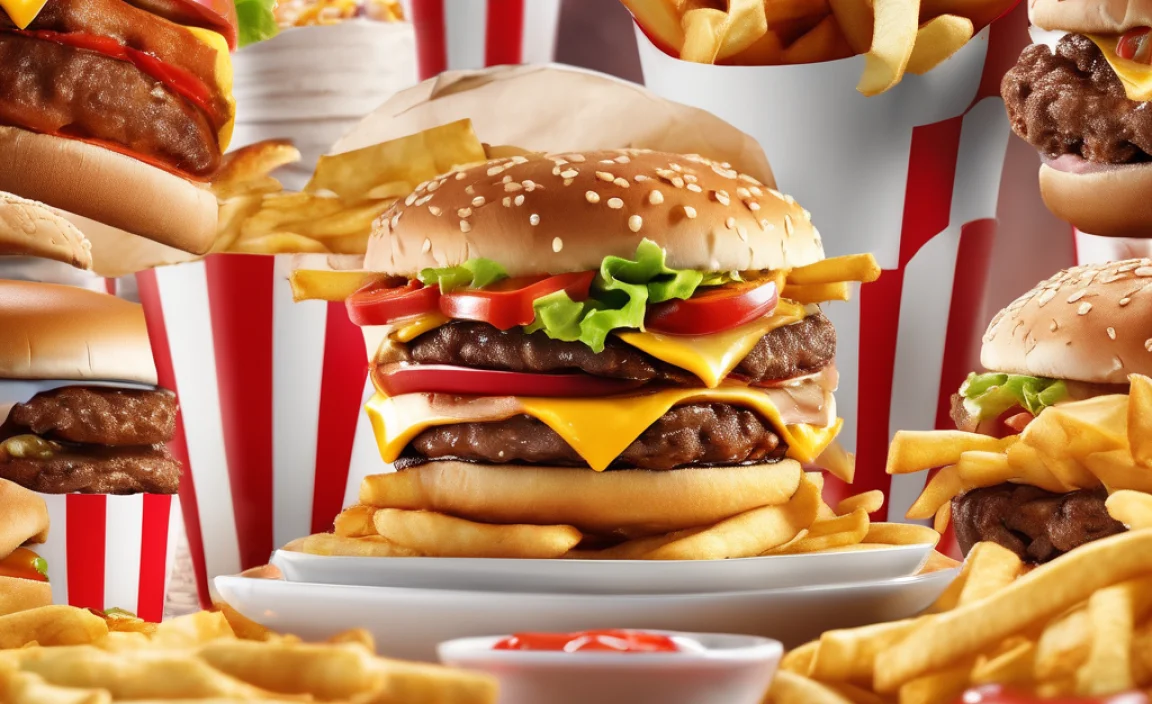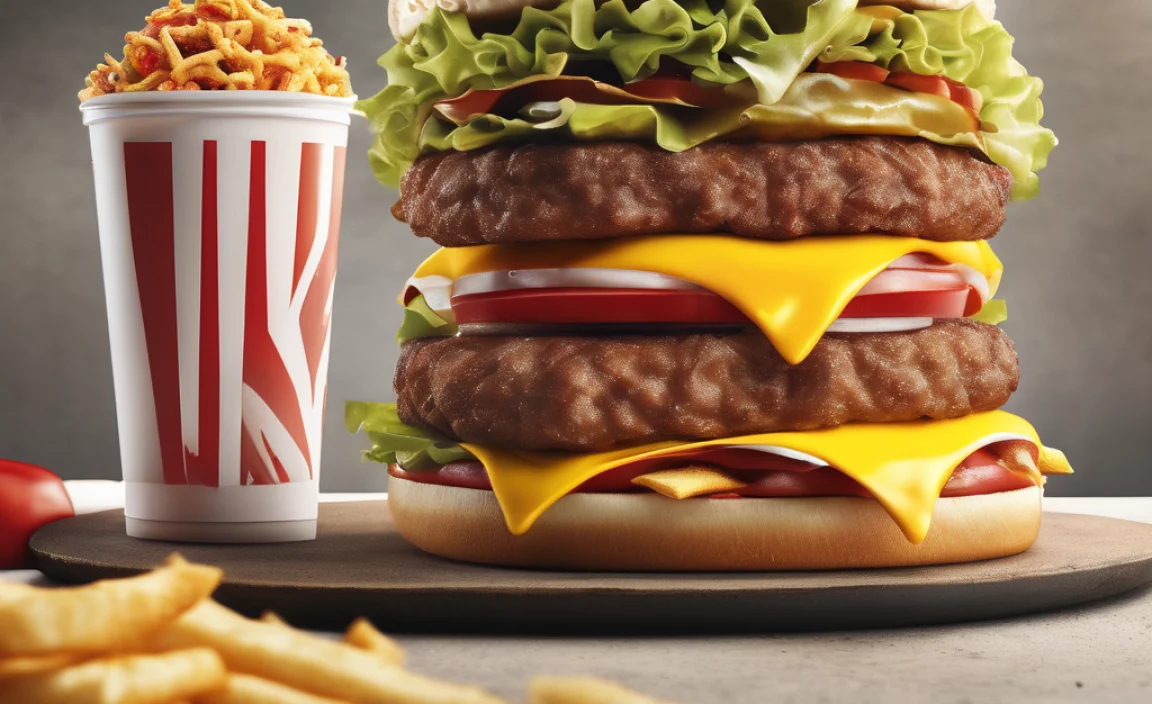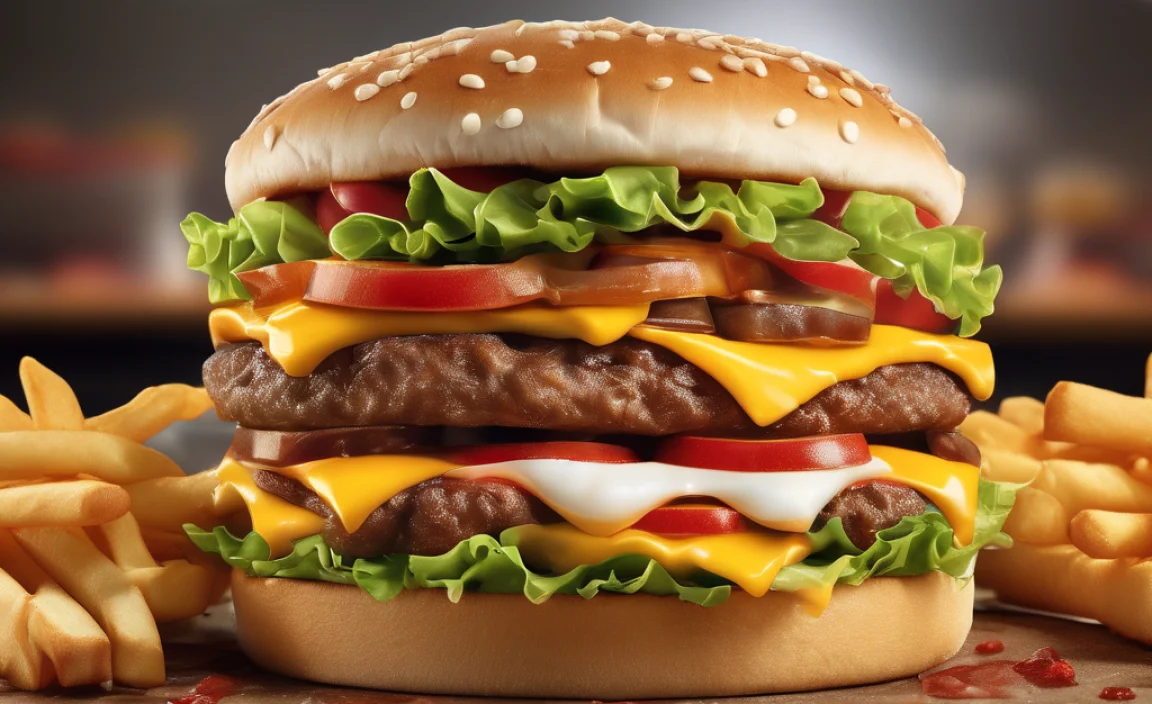Did you know that fast food might not be as harmless as it seems? Many people enjoy a quick burger or fries from their favorite chain. But there are surprising things about fast food that might make you think twice. From strange ingredients to unexpected effects, let’s dive into the shocking facts about fast food.
Key Takeaways
- Fast food often contains unexpected ingredients.
- It can impact your health more than you think.
- You may find shocking facts about fast food nutrition.
- Fast food can have hidden effects on the environment.
- Exploring these facts can change your eating habits.
Shocking Ingredients in Fast Food

Have you ever wondered what’s really in fast food? Many fast food items contain ingredients you may not expect. For instance, some burgers have fillers that aren’t pure meat. These fillers can include soy or corn products. The bread might have chemicals to make it stay fresh longer. And those tasty fries? They might be cooked in oils with additives for flavor. Knowing these ingredients can be surprising. It’s important to understand what you’re eating. This knowledge can help you make better food choices for your health.
- Burgers can have fillers like soy.
- Fries often use oils with additives.
- Bread can contain chemicals for freshness.
- Some sauces have high sugar content.
- Fast food cheese may contain preservatives.
- Chicken nuggets might have textured vegetable protein.
- Soda contains high fructose corn syrup.
Choosing healthier options requires reading labels carefully. By knowing what’s in your food, you can decide what’s best for your diet. It’s amazing how these hidden ingredients can affect your health. Becoming aware of these can help you make smarter choices, both at the fast food counter and in your kitchen at home.
Fun Fact or Stats : Over 90% of fast food meats have some form of filler.
Unexpected Additives
Would you eat something if you knew it had hard-to-pronounce chemicals? Many fast food items contain additives to enhance flavor, color, or shelf life. These additives can include things like sodium benzoate or monosodium glutamate (MSG). While they make your food taste better, they might not be great for you. Have you ever wondered why fast food tastes so good? These chemicals play a big part. Knowing this can make you think twice before ordering your next meal.
The Role of Sugar
Do you think fast food is only about burgers and fries? Think again! Many fast food items have a lot of sugar. Even foods that don’t seem sweet, like bread or sauces, can have hidden sugars. Sugar makes food taste better but can also be unhealthy. Consuming too much sugar can lead to health problems like obesity or diabetes. Next time you enjoy a fast food meal, consider how much sugar you’re eating. It’s a key factor in how these foods taste and how they affect your body.
Mystery Oils
Do you know what oil is used in fast food cooking? Fast food chains often use oils that aren’t the healthiest. These oils might include palm oil or hydrogenated oils. They are used because they are cheap and make food crispy. However, they can also be high in unhealthy fats. These fats can affect your heart health. When eating fast food, consider the type of oil used. It can make a big difference in how healthy—or unhealthy—your meal is.
Fast Food’s Impact on Health

Fast food is convenient and tasty, but it can affect your health. Eating too much fast food can lead to weight gain. It often has high calories, fats, and sugars. These can contribute to health problems like obesity, diabetes, and heart disease. Fast food meals might lack important nutrients like vitamins and minerals. This can impact your growth and health. Knowing how fast food affects your body is important. It helps you make better food choices for a healthier life.
- Fast food can cause weight gain.
- It may lead to heart disease.
- Diabetes risk increases with fast food.
- Fast food lacks essential nutrients.
- Regular fast food can reduce energy levels.
- Too much salt affects blood pressure.
- Fast food can affect mental health.
Understanding the health risks of fast food is crucial. It can motivate you to look for healthier options. Fast food’s convenience is tempting, but the long-term effects on your body are not worth it. Choosing a balanced diet with plenty of fruits and vegetables is a better choice. It ensures you get the nutrients you need to stay healthy.
Fun Fact or Stats : Fast food eaters consume nearly 200 more calories per meal.
Calories Count
Do you know how many calories are in your fast food meal? Fast food items often have high calorie counts. Just one meal can contain more calories than you need in a day. For example, a burger, fries, and a soda can add up to over 1,000 calories! It’s important to be aware of this when choosing what to eat. Watching your calorie intake can help you maintain a healthy weight. Fast food might be tasty, but those extra calories can add up quickly.
Nutrient Deficiency
Why is it important to eat a balanced diet? Fast food usually lacks essential nutrients your body needs. While it fills you up, it may not provide the vitamins and minerals necessary for growth and health. A diet high in fast food can lead to nutrient deficiencies. This means your body might not function properly. Eating a variety of foods, including fruits and vegetables, ensures you get the nutrients you need. Choosing healthier options can improve your health and well-being.
Long-Term Effects
Have you thought about the long-term effects of eating fast food? Over time, a diet high in fast food can lead to serious health problems. Conditions like obesity, heart disease, and diabetes can develop. These health issues can significantly affect your quality of life. It’s essential to make smart food choices now to avoid problems later. Fast food might be a convenient choice, but it’s not always the healthiest. Eating well-balanced meals is vital for a healthy body and mind.
Environmental Impact of Fast Food

Fast food doesn’t just affect our health. It impacts the environment too. Fast food chains produce a lot of waste. This includes packaging like cups, wrappers, and bags. These items often end up in landfills. Fast food production also requires a lot of resources. This includes water, land, and energy. The environmental cost is high. Choosing to eat less fast food can help reduce this impact. It’s a small step that can make a big difference for our planet.
- Fast food generates a lot of waste.
- Packaging often ends up in landfills.
- Production uses many natural resources.
- Fast food impacts air and water quality.
- Reducing consumption helps the environment.
- Sustainable options are available.
- Many chains now offer eco-friendly packaging.
Being aware of fast food’s environmental impact can inspire change. We can choose to reduce our fast food consumption. Opt for restaurants that use sustainable practices. Support businesses that care for the environment. Together, we can help protect our planet and ensure it remains healthy for future generations.
Fun Fact or Stats : Fast food packaging makes up over 30% of total waste.
Waste Production
Have you ever thought about where fast food packaging goes? Fast food creates a lot of waste, from paper bags to plastic cups. This waste often ends up in landfills, taking years to decompose. The more fast food we consume, the more waste we produce. Reducing fast food intake can significantly cut down waste. Choose reusable containers and utensils when possible. Small changes can make a big impact on our environment.
Resource Use
Why do fast food chains need so many resources? The production of fast food requires a lot of natural resources. From water to grow ingredients, to energy for preparation, the costs are high. This resource use can harm the environment. It’s important to be mindful of this impact. Supporting sustainable practices and reducing fast food consumption can help preserve these resources for the future.
Eco-Friendly Options
Are there eco-friendly fast food choices? Some chains are making efforts to reduce their environmental impact. They use biodegradable packaging or source ingredients locally. These changes help lower waste and resource use. As consumers, we can support these efforts by choosing eco-friendly options. By doing so, we encourage other chains to adopt similar practices, leading to a healthier planet.
Fast Food and Children’s Health

Fast food is popular among kids, but it can affect their health. Many fast food meals have high calories, fats, and sugars. These can contribute to weight gain and health problems in children. Kids need a variety of nutrients for growth and development. Fast food often lacks these essential nutrients. Consuming too much fast food can lead to nutrient deficiencies. It’s important to balance fast food with healthier choices. This ensures kids get the nutrition they need to grow strong and healthy.
- Fast food is high in calories.
- It can lead to weight gain in children.
- Fast food often lacks essential nutrients.
- Kids need a balanced diet to grow.
- Too much fast food can cause deficiencies.
- Limiting fast food helps maintain health.
- Encourage kids to eat fruits and vegetables.
Parents play an important role in their children’s diet. Encouraging healthy eating habits from a young age can set the foundation for lifelong health. Providing a balanced diet with plenty of fruits and vegetables is important. It ensures kids get the vitamins and minerals they need for strong bodies and minds.
Fun Fact or Stats : One in every three children eats fast food daily.
Healthy Alternatives
What are some healthy alternatives to fast food? Many options are both tasty and nutritious. For instance, homemade sandwiches with whole grain bread and fresh vegetables are a great choice. Fruits and yogurt can be a delicious snack. By preparing meals at home, parents can control the ingredients. This ensures kids receive the nutrients they need. It’s important to find creative ways to make healthy foods appealing to children.
Impact on Growth
How does fast food affect a child’s growth? Fast food often lacks important nutrients like vitamins and minerals. These are essential for a child’s development. A diet high in fast food can lead to nutrient deficiencies. This can affect a child’s growth and health. Providing a balanced diet helps ensure children grow strong and healthy. Parents should encourage their kids to try a variety of foods to meet their nutritional needs.
Building Healthy Habits
How can parents help kids build healthy eating habits? It’s important to introduce a variety of healthy foods from a young age. Parents can set a good example by choosing nutritious options themselves. Cooking meals together can make healthy eating fun. Teaching kids about the benefits of different foods encourages them to make better choices. Building these habits early can lead to a lifetime of good health.
Conclusion
Fast food can be convenient and tasty, but it’s important to be aware of its effects. Shocking facts about fast food reveal its impact on health, the environment, and more. Knowing what’s in your food can help make better choices. Balancing fast food with healthier options is key to a healthy lifestyle. Choose wisely and enjoy a balanced diet for a healthier future.
FAQs
Question: What are the shocking facts about fast food?
Answer: Fast food often contains unexpected ingredients and additives. It can impact health and the environment. These surprising details can change how you view fast food. Understanding these facts helps you make informed choices about your diet and lifestyle.
Question: How does fast food affect health?
Answer: Fast food can lead to weight gain and health issues like obesity and diabetes. It’s high in calories, fats, and sugars. Regular consumption may also cause nutrient deficiencies. It’s important to balance fast food with healthier choices for better health.
Question: Why should we care about fast food’s environmental impact?
Answer: Fast food production generates waste and uses many natural resources. This impacts the environment. By reducing fast food consumption, we can help preserve resources and reduce waste. Supporting sustainable practices makes a positive difference.
Question: Are there healthier alternatives to fast food?
Answer: Yes, there are many healthy alternatives to fast food. Homemade meals with fresh ingredients offer better nutrition. Fruits, vegetables, and whole grains are great choices. Preparing meals at home allows control over ingredients for healthier eating.
Question: How can fast food affect children’s health?
Answer: Fast food can lead to weight gain and nutrient deficiencies in children. It’s often high in calories and lacks essential nutrients. Encouraging balanced eating habits ensures kids get the nutrition needed for growth and development.
Question: Can knowing shocking facts about fast food change eating habits?
Answer: Yes, understanding the shocking facts about fast food can lead to better choices. Awareness of ingredients, health impacts, and environmental effects can encourage healthier eating habits. It helps prioritize nutrition and sustainability in food decisions.











